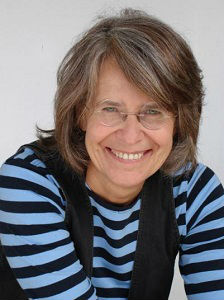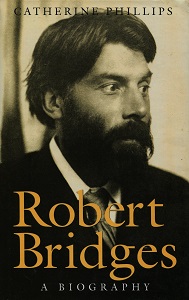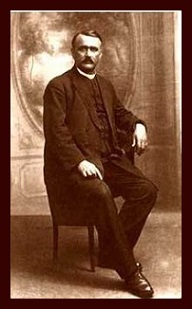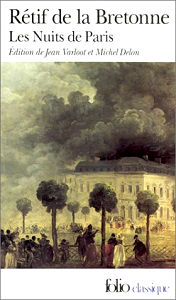|
De Nederlandse dichter en schrijver Michel van der Plas werd geboren op 23 oktober 1927 in Den Haag. Zie ook alle tags voor Michel van der Plas op dit blog.
Groenendaal
Zestien. — Ik liep de poort van Hageveld
uit in de rij. Seminarist. Dat ging
op zondag zo: twee uren welgeteld
de lanen door. Het heette wandeling.
Zo kwam ik voor het eerst in Groenendaal.
Het breedste pad: wat was het op het spoor?
Ze marcheerden zo’n beetje allemaal.
Maar ik keek steeds tussen de bomen door.
Midden juni geloof ik dat het was.
Iemand zwamde over de Ilias.
Maar ’t was of daar, ver weg, een feest begon.
God, dacht ik, als ik daar nu zitten kon,
fosco drinken of zo op dat terras
tussen mooie mevrouwen in de zon.
Credo
Moedertje, gij zijt mijn ster, gij flonkert,
gij ligt veilig in de hand van God;
al de klaarheid waar mijn hart naar hunkert
is uw ademtocht, uw wijn, uw brood.
Ik geloof in u, en ik zal zingen
van uw rein bestaan zolang ik leef;
ik vertrouw op u, gij zult mij brengen
waar gij zijt; ik heb u vurig lief.
Ik ben blij vannacht, ik kan wel uren
aan u denken en steeds wordt gij meer:
alles wat gebeuren moet gebeure,
steeds zie ik u beter, zekerder.
Ik zwerf naar u toe, ik zal niet keren:
heilig moedertje, gij zijt mijn ster.
Griekse legatie
Het helle wit der oude collonnaden
vergrijsde blijkbaar aan dit breed gebouw,
of komt het, daar de hemel hier zijn blauw
zo rijk niet uitstalt achter de facade?
Terwijl ik wacht tot donkere Hellenen,
Ilias-reciterend en voornaam,
verschijnen in de poort, zie ik door 't raam
zonder bevreesd te zijn voor de Sirenen.
De mijmering breekt op gewone dingen.
Geen leest Homerus, nergens hoor ik zingen,
alleen staan hier de dorre requisieten
te wijzen wat de tijden overlieten,
dat naast de vele zeer gewone dingen
een reproductie hangt van Aphrodite.

Michel van der Plas (23 oktober 1927 -21 juli 2013)
Cover biografie
De Zuid-Afrikaanse dichteres en schrijfster Antjie Krog werd geboren in Kroonstad op 23 oktober 1952. Zie ook alle tags voor Antjie Krog op dit blog.
Visioen van een natie
hoe lang denken we het hier uit te houden?
wij die gestrand zijn tegen dit rijke continent
zonder ooit onloochenbaar in Afrika te landen
wij in huizen in Amerikaans-koloniale stijl
die wij omringen met parken en tuinen
om aan de aanspraak van het landschap te ontsnappen
die op kelims lopen, in Nederlands dialect praten
naar Duitse liederen luisteren en Engelse poëzie lezen
die 's ochtends eieren met spek eten
onze lijven in westerse mode hijsen
met vakantie over het continent naar het noorden vliegen
om ons in stamlanden te laven aan muziek en kunstgalerijen
en na terugkeer onder het Pruisische schilderij van Domsaitis
uit Fins glas Glenfiddich drinken
waarom ook niet? hier zijn we na drie eeuwen nog niets anders
dan een stukje westers curiosum.
Bemind worden door een dichter
vlak bij de Meir loop ik Veerle tegen het lijf
bruin haar scheve baret laarzen jas
hoe gaat het? ze vertrekt haar mondhoek
even maar alsof het er niet toe doet
haalt haar schouders op en knikt we groeten
en lopen ieder een andere kant op
ik kijk nog eens om maar ze is al verdwenen
gewoon tussen de anderen als de anderen
en niemand weet dat zij ooit is besnuffeld
door goddelijke hersenen dat zij gerafeld
van passie uit haar lakens is getuimeld dat
zoveel geilheid in haar holtes is gedroomd
zoveel landschappen tussen haar benen open
gesnorkeld zijn dat elke dag elke kant op kon kantelen
gestuwd werd zij door
een begaafde onder de goden
nu is hij dood ze heeft hem tot het einde toe bijgestaan
en loopt gewoon als gewoon mens tussen anderen

Antjie Krog (Kroonstad, 23 oktober 1952)
De Albanees-Amerikaanse schrijfster en actrice Masiela Lusha werd geboren op 23 oktober 1985 in Tirana. Zie ook alle tags voor Masiela Lusha op dit blog.
Roma I
Roma,
I never visited you before this.
I have dreamt of you, but in my dreams
I never touched you- not as I touch you now.
Today, I have seen your shells of stained colors
Sparkle and twist by light,
Staining the pews and ivory giants
The brilliant shades of your faith.
I stepped and stumbled on white-faced stones,
And secretly pressed my pink palm on your cold marble,
In natural rainbow values.
So bright, vast walls were designed
And painted just with your stones.
Azure, pink, caramel, and emerald dreams of nature.
All marble, all fantastic.
Today you welcomed me into your altars and cathedrals,
You presented me to your martyrs, who told me their story
In their carved gestures and carved books.
So cherished are their teachings-
These treasures of marble
Pages are chiseled into their ivory hands.
'Ars Longa, Vita Brevis'
I searched the details of their feet I could not reach
And further walked this hall of colossal saints and apostles,
Equally high. They were not meant to be touched
By these mortal hands. They had endured too much.
Today, your temples, worn as patches of identity,
Stand as primitive and earthly as carved mountains
Quietly regning over your dwelling fellow hearts
After two thousand years; narrating a story of sensual art
As ancient as it is modern. So modern,
We visit your faith, to learn- and return, to learn more.
History will always mother and lead a civilization,
but you will always be the mother of history, for on your bruised
Hand sprawls two parallel cities, one
Mastering the untouched golden and marble
Statues of time, virtue and blood,
The other, a modern stage for comfort play.
Roma, on your creased palm of seven hills
Lies a world as unmarred as the virtuous talent
of speech, grace, and mortal art found in your sons
And daughters; your children we call eternal masters.

Masiela Lusha (Tirana, 23 oktober 1985)
De Amerikaanse schrijver Augusten Xon Burroughs werd geboren op 23 oktober 1965 in Pittsburgh, Pennsylvania. Zie ook alle tags voor Augusten Burroughs op dit blog.
Uit: Possible Side Effects
“But my grandmother spent every minute with me. And I adored her.
Carolyn was blond and wore minks. She had gigantic jade and diamond rings on nearly every finger. And a gold charm bracelet that made a soft tinkle sound when she waved her hands in the air. At night, she slipped into a nightgown with fur trim along the neck and at the hem. And even her slippers had high heels. I thought she was beautiful, like a movie star.
Only when she leaned in very close to me and I saw through her thick pancake makeup to the deep lines beneath did I become slightly alarmed. Old people had always scared me a little. And while my grandmother certainly wasn't old from a distance, she seemed brittle when you looked at her very closely. Sometimes when she kissed me on the forehead at night, I flinched, worried a piece of her might chip off and stick to me.
The summer I turned seven the tooth on my upper left side became loose. And I spent the afternoon worrying it with my finger.
"Honey, just let that tooth come out all on its own accord. Don't force it before it's ready," my grandmother said.
"But Carolyn, it's almost ready. It's just about to come out." "Well, sweetie. Just let it be. It'll come out. And then do you know what to do?" she asked.
We were sitting on iron garden chairs in her glass sunroom. I was watching television and Carolyn was paging through a mailorder catalogue, licking her fingers and then dog-earring the corners of certain pages.
"Do when?" I said.
"Do you know what to do when your tooth falls out?" she asked, smiling at me.
I didn't understand what she was asking me. Was there something I had to do?
"Call the police?" I guessed.
She laughed in her gentle, though somewhat mischievous way.
"No, you don't call the police, silly. Don't you know about the Tooth Fairy?"
"The what?"
"Honey," she said, now concerned. She placed her catalogue on her lap and leaned forward. "The Tooth Fairy? You know about the Tooth Fairy. How could you not? You're seven years old. Surely, you know about the Tooth Fairy."

Augusten Burroughs (Pittsburgh, 23 oktober 1965)
De Engelse dichter, toneel- en prozaschrijver Robert Seymour Bridges werd geboren in Walmer, Kent, op 23 oktober 1844. Zie ook alle tags voor Robert Bridges op dit blog.
Elegy
I have lov'd flowers that fade,
Within whose magic tents
Rich hues have marriage made
With sweet unmemoried scents:
A honeymoon delight,—
A joy of love at sight,
That ages in an hour:—
My song be like a flower!
I have lov'd airs that die
Before their charm is writ
Along a liquid sky
Trembling to welcome it.
Notes, that with pulse of fire
Proclaim the spirit 's desire,
Then die, and are nowhere:—
My song be like an air!
Die, song, die like a breath,
And wither as a bloom:
Fear not a flowery death,
Dread not an airy tomb!
Fly with delight, fly hence!
'T was thine love's tender sense
To feast; now on thy bier
Beauty shall shed a tear.
To Catullus
Would that you were alive today, Catullus!
Truth ’tis, there is a filthy skunk amongst us,
A rank musk-idiot, the filthiest skunk,
Of no least sorry use on earth, but only
Fit in fancy to justify the outlay
Of your most horrible vocabulary.
My Muse, all innocent as Eve in Eden,
Would yet wear any skins of old pollution
Rather than celebrate the name detested.
Ev’n now might he rejoice at our attention,
Guess'd he this little ode were aiming at him.
O! were you but alive again, Catullus!
For see, not one among the bards of our time
With their flimsy tackle was out to strike him;
Not those two pretty Laureates of England,
Not Alfred Tennyson nor Alfred Austin.

Robert Bridges (23 oktober 1844 – 21 april 1930)
Cover biografie
De Oostenrijkse schrijver Adalbert Stifter werd geboren in Oberplan op 23 oktober 1805. Zie ook alle tags voor Adalbert Stifter dit blog.
Uit: Der Nachsommer
“Dies hörte endlich auf, anfänglich weil der Vater älter wurde und die Mutter, die er sehr verehrte, nicht mehr leicht entbehren konnte; später aber aus dem Grunde, weil es ihm gelungen war, in der Vorstadt ein Haus mit einem Garten zu erwerben, wo wir freie Luft genießen, uns bewegen und gleichsam das ganze Jahr hindurch auf dem Lande wohnen konnten.
Die Erwerbung des Vorstadthauses war eine große Freude. Es wurde nun von dem alten, finstern Stadthause in das freundliche und geräumige der Vorstadt gezogen. Der Vater hatte es vorher im allgemeinen zusammen richten lassen, und selbst, da wir schon darin wohnten, waren noch immer in verschiedenen Räumen desselben Handwerksleute beschäftigt. Das Haus war nur für unsere Familie bestimmt. Es wohnten nur noch unsere Handlungsdiener in demselben und gleichsam als Pförtner und Gärtner ein ältlicher Mann mit seiner Frau und seiner Tochter.
In diesem Hause richtete sich der Vater ein viel größeres Zimmer zum Bücherzimmer ein, als er in der Stadtwohnung gehabt hatte, auch bestimmte er ein eigenes Zimmer zum Bilderzimmer; denn in der Stadt mußten die Bilder wegen Mangels an Raum in verschiedenen Zimmern zerstreut sein. Die Wände dieses neuen Bilderzimmers wurden mit dunkelrotbraunen Tapeten überzogen, von denen sich die Goldrahmen sehr schön abhoben. Der Fußboden war mit einem mattfarbigen Teppiche belegt, damit er die Farben der Bilder nicht beirre. Der Vater hatte sich eine Staffelei aus braunem Holze machen lassen, und diese stand in dem Zimmer, damit man bald das eine, bald das andere Bild darauf stellen und es genau in dem rechten Lichte betrachten konnte.
Für die alten geschnitzten und eingelegten Geräte wurde auch ein eigenes Zimmer hergerichtet. Der Vater hatte einmal aus dem Gebirge eine Zimmerdecke mitgebracht, welche aus Lindenholz und aus dem Holze der Zirbelkiefer geschnitzt war. Diese Decke ließ er zusammen legen und ließ sie mit einigen Zutaten versehen, die man nicht merkte, so daß sie als Decke in dieses Zimmer paßte. Das freute uns Kinder sehr, und wir saßen nun doppelt gerne in dem alten Zimmer, wenn uns an Abenden der Vater und die Mutter dahin führten, und arbeiteten dort etwas, und ließen uns von den Zeiten erzählen, in denen solche Sachen gemacht worden sind.”

Adalbert Stifter (23 oktober 1805 – 28 januari 1868)
Cover
De Amerikaanse dichter, schrijver en journalist Nick Tosches werd geboren op 23 oktober 1949 in Newark, New Jersey. Zie ook alle tags voor Nick Tosches op dit blog.
Uit: Under Tiberius
“He nodded with a slight smile, as though sensing what I had surmised, and affirming it. “No one knows all that is here. Some of them are three or four thousand years old, maybe older.” He paused, then slowed his pace as we proceeded. “The even older writings, the clay tablets, are in a vault in a room that diverges from the start of this passage. Back there. We passed it a while ago. Some of these scrolls may be as old as some of those tablets. No one knows. That’s the trouble with this place. There has never been a complete and serious inventory of what is here.”
The passage of leather-cased scrolls led to a wider passage. He called this the place of books before paper. Piles and piles of the earliest codices: sheets rather than scrolls of papyrus or parchment, bound together between wooden covers. Most of these were from about two thousand years ago, among the oldest codices to have survived.
“Look at this,” he said. “The first books. Heaped and strewn like trash in the basement.” He mumbled something about ratti—rats, something about uno caseggiato bassifondo—a slum tenement; then he shook his head. “They say that Pius VIII sent his servants down here to fetch kindling to keep his fireplaces roaring in winter.”
Looking at this mess, he turned still as stone, as if he had been looking at it all his life. I picked up a codex. There was very little wood left of its original covers. The dust of the ages seemed to be the only solvent holding it together. The old man did not mind that I had raised it in my hands. I very carefully opened it, turned its friable, torn leaves. My fingers were filthy with its dirt. I slowly, gently turned a few pages, looking at what remained of the faded ink on those pages. It was written in Latin, in an elegant hand. I tried to make out the words, tried to make sense of them.
The elderly priest joined me in looking at the page. “Good parchment. Good atrament: looks like cuttle-fish, the best the Romans had. And the hand-writing: adept. A bit shaky, but adept. No cheap job, this one.”
He placed his own fingers to the pages, and, while I continued to hold the codex, removed my free fingers from the pages and let his take their place. He was reading the Latin far more ably and with far more alacrity than I had managed, and he pronounced the words in a whisper as he read.
“Tristissimus hominum,” he whispered. He repeated the phrase, no longer in a distracted whisper: “Tristissimus hominem. ‘The gloomiest of men,’” he translated. He seemed stunned. “This is a book about Tiberius,” he said. “By someone who knew him. Knew him.”

Nick Tosches (Newark, 23 oktober 1949)
De Albanese dichter, vertaler en pater Franciscaan Gjergj Fishta werd geboren op 23 oktober 1871 in Fishta të Zadrimes. Zie ook alle tags voor Gjergj Fishta op dit blog.
THE HIGHLAND LUTE (fragment)
Nor did he show shame or sorrow
That he'd caused the two such bloodshed,
Both Albania and Montenegro.
Moscow gave him heart and courage!
In Petrograd the Tsar of Russia
Took an oath before his people,
To be heard by young and old there
Not to celebrate a Christmas,
Not to take part as godfather
In baptisms or in weddings,
Not to wash or comb his hair more,
Not to take part in assemblies,
Ere he'd entered into Stamboul,
Ere he'd made himself the sultan,
Ruler over land and water,
Cut off all of Europe's trade routes,
Banning all their sales and buying,
Letting no one start a trade up,
Holding Europe in his power.
Should she even seize a breadcrumb,
She would end up in his clutches,
Captive in his bloodstained clutches,
Which were deft at theft and stealing!
But the sly old fox was clever,
Cheater in both words and letters,
One whose falseness knew no equal,
He knew well what lay before him,
No light task to enter Stamboul,
No light task subjecting Turkey
Without his own neck in peril.

Gjergj Fishta ( 23 oktober 1871 – 30 december 1940)
De Franse schrijver Nicolas Edmonde Restif de La Bretonne werd geboren op 23 oktober 1734 in Sacy bij Auxerre. Zie ook alle tags voor Réstif de la Bretonne op mijn blog.
Uit: Les Nuits de Paris
“Le coin des Grands-Degrés
Je dénonce au gouvernement non pas un homme, ni même un forfait, mais une maison qui blesse le droit public et par là plus criminelle (matériellement) que l'assassin Cartouche et que tous les scélérats qui ont infesté la capitale... Cette maison est située en face de la rue de la Bûcherie, qu'elle borne. C'est un des passages les plus fréquentés de Paris, surtout pour le bois et le vin. Cette maison oblige les voitures et les gens de pied de tourner deux fois de suite à angle droit, en moins de trente pas, à l'issue d'un abreuvoir, destiné aux chevaux d'un vaste quartier et aux bœufs de quarante à cinquante boucheries ; ce qui rend ce passage le plus dangereux de la capitale. La position de cette maison cause tous les jours des accidents ; elle occasionne des frayeurs mortelles aux femmes, qui tombent à l'improviste entre les cornes des bœufs ou sous les pieds des chevaux. Les enfants, les vieillards, les hommes même les plus alertes et les plus ingambes se trouvent pris au double détour et sont aplatis contre le mur par une roue qui tourne trop court. Il n'est rien de plus urgent que d'abattre cette maison qui est un piège tendu aux citoyens par un mauvais génie. Elle périclitait, il y a quelque temps, et le propriétaire l'a restaurée : il l'a munie de grosses bornes, qui rétrécissent encore le passage et augmentent le danger pour les piétons. Il aurait été puni dans Athènes.
Je sortis à cinq heures. En débouchant la rue des Grands-Degrés, j'aperçus un cocher de fiacre ivre, qui dirigeait sa voiture droit sur une laitière du soir, abritée sous une porte condamnée de la maison en face, qui courbe le passage. Je m'écriai, en me jetant à la tête des chevaux, dont je ralentis la course : ce qui donna à la laitière le temps de se jeter à l'écart.”

Réstif de la Bretonne (23 oktober 1734 – 3 februari 1806)
Cover
Zie voor nog meer schrijvers van de 23e oktober ook mijn blog van 23 oktober 2017.
|



